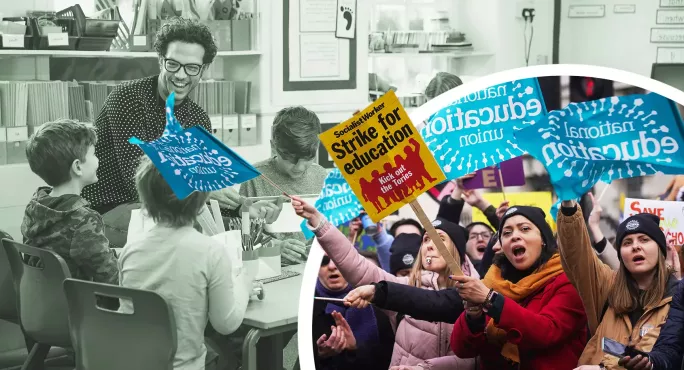The Department for Education has suggested that there is a strong case for around three in four pupils to continue receiving education in schools during strikes as part of its minimum service level plan.
A discussion paper sent to unions said there was a strong case for certain groups to continue receiving face-to-face education, including cohorts due to take exams, vulnerable children and all primary school pupils.
The list, seen by Tes, also includes children of critical workers and in total represents 74 per cent of all pupils and further education students.
Education unions had been in discussions with the DfE since last month over the government’s plan to introduce minimum service levels in schools.
The plan would involve identified staff being required to work during a strike action.
Education secretary Gillian Keegan had previously warned that government would consult on introducing minimum service levels in schools if voluntary agreements on staffing levels during strikes could not be reached.
Now, Tes can reveal a list of pupils whom the DfE has suggested should remain in classrooms.
This follows reports that talks between the unions and Ms Keegan had broken down, and that the government is now set to press ahead with consultations over minimum service levels.
Tes understands that unions are set to meet with DfE officials this morning.
An internal discussion document shared with unions reveals that the government had proposed “a particularly strong case for ensuring face-to-face provision” for a number of pupil cohorts.
The cohorts listed in the draft document are “vulnerable children and young people”, “pupils due to take public examinations [including key stage 2 Sats], “children of critical workers” and “primary aged pupils (Reception to Year 6)”.
The document also reveals that the DfE welcomed the unions “putting forward a proposal including the groups referenced above for discussion” on 1 November.
Labour has said that it would repeal the minimum service level strike legislation brought in by the Conservatives.
‘A profoundly illiberal policy’
Speaking to Tes after reports that talks had broken down, NAHT general secretary Paul Whiteman said that “as far as we were concerned, we were still in talks”.
Mr Whiteman added that unions had not refused a voluntary arrangement and that he hoped “someone from the government will have the courtesy to call and tell us what is going on”.
He said: “We now have proof that the government has never been serious about getting the buy-in from the profession…This is a purely ideological attack from the government, aimed at removing workers’ fundamental rights, and will do nothing to solve the fundamental problems inherent in the education system.”
Geoff Barton, general secretary of the Association of School and College Leaders, said ASCL was concerned that the legislation would be “used by the government to impose a miserly pay award next year, which will further erode the real value of teacher pay and worsen a recruitment and retention crisis that is causing huge damage”.
Minimum service levels are “a profoundly illiberal policy by a government that has lost the argument”, he added.
Daniel Kebede, general secretary of the NEU, said: “Instead of being tough on strikes, they should be tough on the causes of strikes.”
The DfE has been approached for comment.




